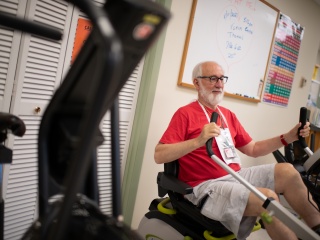Atrial Fibrillation (AFib)
Atrial Fibrillation Care at UVM Health
Atrial fibrillation (AFib) is one of the most common heart rhythm disorders, affecting more than 2.5 million people in the United States. AFib happens when your top two heart chambers (atria) quiver, or fibrillate, causing your heart to beat irregularly. This quiver may cause a rapid heartbeat, or you may feel like your heart skips a beat.
AFib can be serious, increasing your risk of complications such as blood clots or stroke, but effective atrial fibrillation treatments exist.

Why Choose UVM Health?
Specialists in the heart rhythm disorders program at University of Vermont Health offer comprehensive care for atrial fibrillation. We quickly and effectively find the root cause of irregular heart rhythms and create personalized, effective treatment plans to help you live your healthiest life.
As one of the leading heart and vascular programs in the region, we offer:
- Experienced, expert care: Our team includes doctors at the top of their fields who perform high volumes of advanced heart and vascular procedures. Several members of our team came to us from the world-renowned Cardiac Arrhythmia Research Institute, a research center at the leading edge of heart rhythm care.
- Advanced treatments: As part of a health network anchored by an academic medical center, our physicians are active researchers as well as expert clinicians bringing you the latest treatment options, sometimes before they’re widely available.
- Coordinated services: With UVM Health locations throughout northern New York and Vermont, you’re never far from an AFib expert. If you need more advanced treatment, we quickly coordinate referrals so you get the care you need, when and where you need it.
My nurse held my hand and said ‘I’m here with you. I’m not going to leave your side until I know you’re OK.' Those simple words changed everything for me.
Who is Most Likely to Develop AFib?
Anybody can develop atrial fibrillation, but there are some groups of people who are more likely to have the condition. AFib is more common in people with a history of:
- Diabetes
- Heart attacks
- Heart disease, including heart valve problems
- High blood pressure
- Sleep apnea
- Thyroid disorders
You’re also more likely to develop AFib if you:
- Are 60 or older
- Are a long-term heavy drinker or binge drink alcohol, which is defined as five or more drinks in two hours for males and four or more drinks for females
- Have a family history of atrial fibrillation
Symptoms of Atrial Fibrillation
Some people have no symptoms of atrial fibrillation. Some people have constant symptoms (chronic atrial fibrillation), while others may have symptoms that come and go (paroxysmal atrial fibrillation).
Signs of AFib may include:
- Heart palpitations, which may feel like a fluttering, racing, pounding or uneven heartbeat
- Shortness of breath
- Weakness
- Chest pain
- Decreased blood pressure
- Dizziness or fainting
- Confusion
Watchman Device Reduces Stroke in AFib Patients
The Watchman device is a tiny, parachute-shaped heart implant used to prevent stroke in patients with irregular heartbeat (atrial fibrillation) and other heart conditions.
Atrial Fibrillation Treatment
The severity of your AFib symptoms will determine what type of treatment you need. In general, AFib treatment focuses on restoring a typical heart rhythm and preventing complications such as blood clots, stroke or heart failure.
Some people can manage AFib with lifestyle changes, such as lowering caffeine intake or regular exercise. More serious atrial fibrillation may require medication or a surgical procedure.
UVM Health cardiologists consider all factors that affect your overall health and heart rhythm. Your care team will work with you to create a personalized, effective treatment plan that fits your lifestyle and goals. Your treatment may include:
Medications for AFib may prevent blood clots or control heart rhythm. They include:
- Anticoagulants (blood thinners): Dissolve blood clots or prevent them from forming
- Beta blockers: Help relax your heart, lower your blood pressure and decrease your heart rate
- Calcium channel blockers: Control your blood pressure and help your heart beat more slowly
- Digitalis (digoxin): Help your heart beat more strongly and consistently
- Potassium channel blockers: Slow down the electrical signals that cause an irregular heartbeat
- Sodium channel blockers: Reduce your heart’s ability to send electrical signals and regulate your heart rhythm
Cardioversion is a treatment to restore a typical heart rhythm. There are two kinds of cardioversion:
- Chemical cardioversion: Your cardiologist may give you an intravenous (IV) medication intended to reset your heartbeat to a normal rhythm. If it is effective, you may continue taking an oral version of the same medicine to prevent further AFib.
- Electrical cardioversion: This procedure sends a brief, external electrical shock to your heart to reset it to a typical rhythm.
If your symptoms don’t improve with medication or other noninvasive therapies, your cardiologist may recommend cardiac ablation procedures. Cardiac ablation uses cold, heat or laser energy to create scar tissue on your heart that blocks abnormal electrical signals. The most common cardiac ablation procedures include:
- Atrioventricular (AV) node ablation: A catheter is used to send hot or cold energy to the AV node, the structure that sends electrical signals between your heart’s upper chambers (atria) and lower chambers (ventricles). The energy destroys the AV node and blocks irregular signals. Afterward, you will need a permanent pacemaker device to manage your heart rhythm.
- Radiofrequency catheter ablation: Your provider inserts a catheter through a blood vessel and guides it to your heart. They then send radiofrequency energy through the catheter to destroy small areas of your heart tissue where the abnormal rhythm occurs.
- Maze procedure: Your provider uses heat, cold energy or a scalpel to create a pattern of scars on your heart tissue. This scar pattern blocks irregular electrical signals from traveling through your heart. The Maze procedure is usually an open-heart surgery.
If you are unable to take blood thinners, your cardiologist may recommend the Watchman device to prevent stroke. The Watchman device is an umbrella-shaped heart implant inserted using a catheter. The device blocks blood clots formed in the left atrial appendage (LAA) from breaking off and traveling to the brain, where they may cause a stroke. Our heart and vascular team are the only providers in Vermont to offer catheter-based treatments as an alternative for patients who cannot tolerate blood thinners.
Locations Near You
Share your location to see nearby providers and availability
118 Tilley Drive
Suite 102
South Burlington, VT 05403-4450
75 Park Street
Elizabethtown, NY 12932
101 Adirondack Drive
Suite 1
Ticonderoga, NY 12883
133 Park Street
Malone, NY 12953
62 Tilley Drive
Suite 101
South Burlington, VT 05403-4407
133 Park Street
2nd Floor
Malone, NY 12953-1244
130 Fisher Road
MOB-A Suite 2-1
Berlin, VT 05602-9000
214 Cornelia Street
Suite 203
Plattsburgh, NY 12901-2332
115 Porter Drive
Middlebury, VT 05753-8527
111 Colchester Avenue
Main Campus, East Pavilion, Level 5
Burlington, VT 05401-1473


